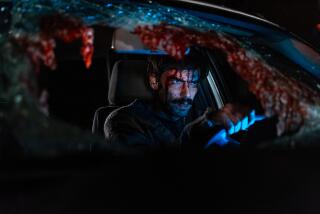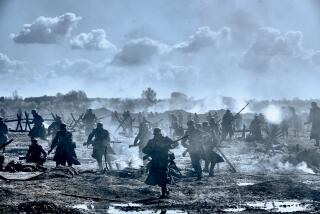Universal Digs Up Legendary ‘Mummy’
- Share via
With the release Friday of Universal’s special-effects-laden new version of the horror classic “The Mummy,” the studio’s home video division is unwrapping the dearest “Mummy” of them all: the legendary 1932 version starring Boris Karloff in the title role.
This terrifically fun flick ($15) has been digitally mastered and the new packaging features the original poster art.
Directed by Karl Freund, the famed cinematographer who later worked in that capacity on “I Love Lucy,” this “Mummy” finds Karloff as Imhotep, an Egyptian mummy who is revived after being buried alive for 3,000 years. Zita Johann co-stars as the beautiful young woman whom Karloff believes is the reincarnation of his lady love, Princess Anck-es-en-Amon. David Manners and Edward Van Sloan also star.
Freund, who was the cinematographer on 1931’s “Dracula,” delivers the chills through his evocative lighting and leisurely pacing. Jack Pierce did Karloff’s amazing makeup.
*
Documentary buffs are in for a treat with the 1919 “South.” Restored last year by the British Film Institute from the original archival material, the Milestone release ($30) marks the first time the original movie has been available in eight decades.
Directed by Frank Hurley, this moving work was filmed on location on South Georgia Island, Elephant Island and the pack ice of the Weddell Sea off the coast of Antarctica from December 1914 to August 1916. It chronicles the renowned Antarctica explorer Sir Ernest Shackleton and his crew of 27, who set out in 1914 on board the ship the Endurance and planned to cross the icy continent. But within a day’s travel from land, the Endurance became trapped in an unusually heavy pack ice. Completely stuck, Shackleton and his crew drifted northward for the next nine months on the ice. The film features a piano score by Neil Brand. Fabulous.
*
Kino On Video celebrates British and Russian cinema in two new collections.
“Brit Beat Cinema Part II: Mods and Motorcycles in 1960s London” features two delicious black-and-white dramas: “The Girl Getters” from 1966 and 1963’s “The Leather Boys” ($25 each).
Directed by Michael Winner (“The Jokers,” “Death Wish”), “Girl Getters” features a star-making performance from a very young Oliver Reed--who died Sunday--as Tinker, a handsome Don Juan who works as a beach photographer at an English seaside resort. He and his pals (including David Hemmings) stake out the prettiest girls visiting the beach. He meets his match, though, when he falls in love with a beautiful fashion model (Jane Merrow).
Sidney J. Furie (“The Ipcress File”) is the director of 1963’s bittersweet “The Leather Boys,’ starring Rita Tushingham and Colin Campbell. The two play high school sweethearts who marry too young and learn quickly about the hardships of adulthood.
Arriving Tuesday from Kino is “The Soviet Avant-Garde II, Part 2,” which features Sergei Eisenstein’s “Strike,” Dziga Vertov’s “Kino-Eye” and Alexander Dovzhenko’s “Arsenal” ($25 each).
Vertov developed the theory of Kino-Pravda (cinema-truth), with his goal being truth on film. “Kino-Eye,” released in 1924, was the first genuine Soviet documentary and is composed of candid shots of people from all walks of life who didn’t know they were being photographed. “Kino-Eye” has been digitally mastered and features a new score by Robert Israel.
In 1926, Alexander Dovzhenko, a Ukrainian patriot, schoolteacher and cartoonist, set out for the Odessa film studios to learn how to make movies. His second film, 1929’s “Arsenal,” is based on an actual 1918 incident in which a group of Bolsheviks battled national troops in Kiev. Digitally mastered from 35mm archive materials, this is the longest, most complete version released in the United States.
The best of the collection is Eisenstein’s first film, 1924’s “Strike,” which features dazzling images and innovative editing. The film has been digitally remastered and includes an evocative score by the Alloy Orchestra.
To order either of the Kino collections, call (800) 562-3330.
More to Read
The biggest entertainment stories
Get our big stories about Hollywood, film, television, music, arts, culture and more right in your inbox as soon as they publish.
You may occasionally receive promotional content from the Los Angeles Times.











